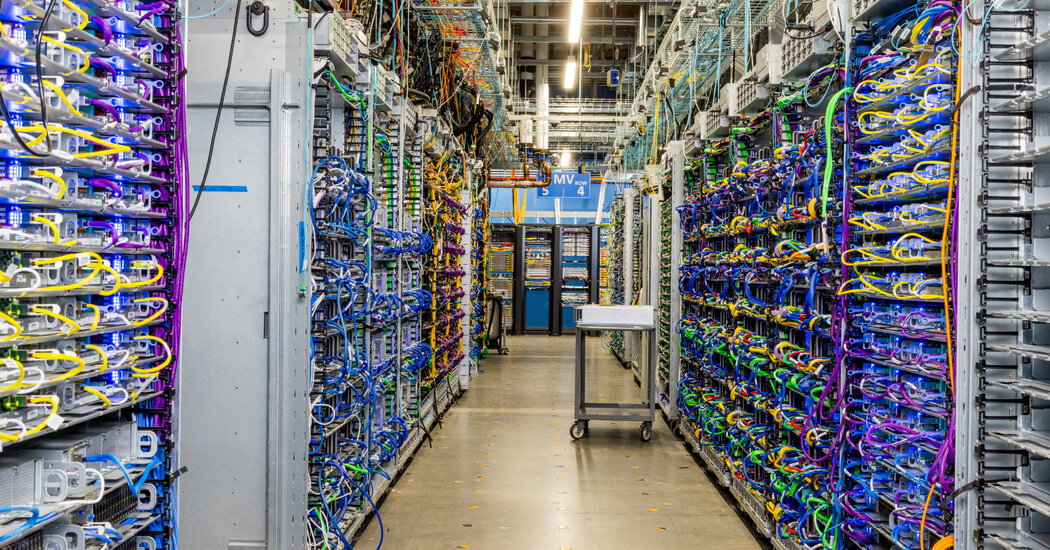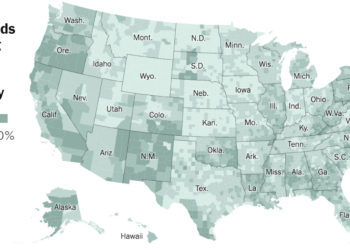Four of the tech industry’s wealthiest companies made it clear this week that their spending on artificial intelligence was not about to slow down.
But the outlays from Google, Meta, Microsoft and Amazon — which all raised their spending by billions of dollars, saying they needed to meet demand for A.I. — are increasingly feeding concerns that the tech industry is heading toward a dangerous bubble.
Artificial intelligence remains an unproven and expensive technology that could take years to fully develop. How much companies will ultimately get back in return from A.I. products like chatbots is unclear. And smaller companies pursuing A.I. gold, financial analysts pointed out, are not nearly as wealthy.
Last week, the Bank of England wrote that while the building of data centers, which provide computing power for A.I., had so far largely come from the cash produced by the biggest companies, it would increasingly involve more debt. If A.I. underwhelms — or the systems ultimately require far less computing — there could be growing risk.
“This is a fast-evolving topic, and the future is highly uncertain,” the bank wrote.
Concerns mushroomed this week after a series of earnings reports. On Wednesday, Google said it was increasing what it planned to spend on A.I. data center projects this year by $6 billion, after dropping nearly $64 billion on them over the past nine months.
Microsoft said it had spent $35 billion in its latest quarter, $5 billion more than what it had told investors to expect just a few months ago. And Meta raised its spending forecast to at least $70 billion by the end of the year, which would be nearly double what it spent last year.
On Thursday, Amazon also said it would be “very aggressive” in adding more data centers and would spend $125 billion this year on capital expenditures — and even more next year.
Google, Microsoft and Amazon, which are the three largest providers of cloud computing in the United States, said they did not have enough computing power to meet customer demand. That’s despite shelling out a combined $112 billion in just the last three months on capital expenditures, which included construction of data centers. Over the last 12 months, those three and Meta totaled more than $360 billion in capital expenditures.
“I thought we were going to catch up,” Amy Hood, Microsoft’s finance chief, said in a call with investors on Wednesday. “We are not. Demand is increasing. It is not increasing in just one place. It is increasing across many places.”
That same day, the Federal Reserve chair, Jerome H. Powell, addressed concerns that the A.I. build-out was unsustainable. He said he did not believe the A.I. investments resembled the late-1990s dot-com boom. Back then, he said, there “was a clear bubble” when the businesses driving the market “were ideas rather than companies.”
Now, Mr. Powell said, the largest companies behind the transformation are highly valued and largely funding their expansions from their own businesses, rather than loose lending.
“I won’t go into particular names, but they have earnings, and it looks like they have business models and profit and that kind of thing, so it is really a different thing,” he said.
Mr. Powell did not comment on concerns that, unlike the biggest tech companies, smaller companies — often the customers and partners of those cloud computing giants — were also spending fast on A.I. projects without the safety net of enormously lucrative online advertising or software businesses.
But for the moneyed foursome that announced earnings this week, spending hundreds of billions of dollars on new data centers is not a worry — not when they churned out a combined $109 billion in operating profit, which excludes taxes and investments, in just the last quarter.
Ms. Hood said Microsoft had $400 billion in future sales under contract. “That’s for booked business,” she said. “Today.” The number did not include the $250 billion in computing power that OpenAI, the creator of the ChatGPT chatbot, committed to buy from Microsoft in an announcement this week.
(The New York Times has sued OpenAI and Microsoft, claiming copyright infringement of news content related to A.I. systems. The two companies have denied the suit’s claims.)
Alphabet, the parent company of Google, raised estimates for how much it planned to spend this year to at least $91 billion from $85 billion. The company is processing at least 20 times as much data through its various A.I. products as it did a year ago, the chief executive, Sundar Pichai, said.
Amazon has doubled its cloud infrastructure capacity since 2022 and expects to double it again by 2027 to meet demand, its chief executive, Andy Jassy, told investors on Thursday. “As fast as we’re adding capacity right now,” he said, “we’re monetizing it.”
Meta, which owns Instagram, Facebook and WhatsApp, also raised its spending estimate for the year, from at least $66 billion to at least $70 billion. But it made a different case for the expenditures.
Unlike the large cloud providers, which have other customers that can use their data centers, Meta makes money from A.I. only when it uses the systems itself — in its core products to make digital ads more effective or its social networking products more engaging. It is also investing heavily to develop what it calls “superintelligence,” a theoretical technology where A.I. systems become smarter than humans.
Mark Zuckerberg, Meta’s chief executive, said he would rather build more and not less to be ready should superintelligence arrive quickly. “That way, if superintelligence arrives sooner, we will be ideally positioned for a generational paradigm shift in many large opportunities,” he said.
If it takes longer, Mr. Zuckerberg said, Meta could use the infrastructure for its core business. “In the worst case,” he added, “we will just slow building new infrastructure for some period while we grow into what we build.”
Investors were less sure. Meta’s stock fell 11 percent on Thursday.
Karen Weise writes about technology for The Times and is based in Seattle. Her coverage focuses on Amazon and Microsoft, two of the most powerful companies in America.
The post Big Tech’s A.I. Spending Is Accelerating (Again) appeared first on New York Times.




